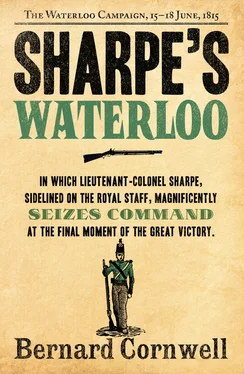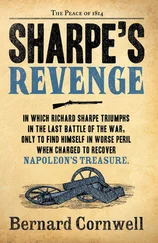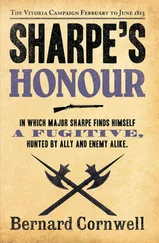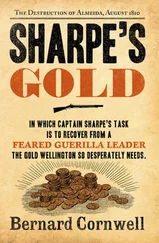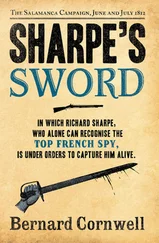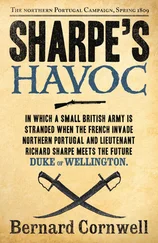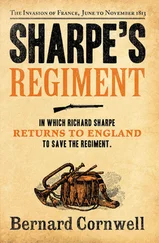Sharpe wanted to slow the French advance. Even a few minutes would help. He dropped in a shallow scrape by the roadside, half hidden by a hazel bush which had been invaded by pink dog roses. None of the approaching enemy seemed to have noticed him. He slid his rifle through the thick grass, then pushed his tricorne hat back so that its peak would not catch on the weapon’s doghead.
He waited. The pistol in his belt dug into his belly. The grass of the road’s verge was warm and dank. There had been rain earlier in the week and the soil under the thick vegetation was still damp. A ladybird crawled up a dry stalk, then stepped delicately across to the oiled and battered stock of the rifle. The enemy marched careless and unsuspecting. The shadows stretched long over the road. It was a summer’s evening as beautiful as God had ever blessed on a wicked world.
A hare appeared on the opposite verge, quivered for a second, then ran swiftly up the road only to leap sideways out of the path of the approaching French infantry. The enemy was three hundred yards away now and marching in a column of four ranks. Sharpe could hear their strong singing. An officer rode ahead of the column on a grey horse. The officer had a red plume on his blue shako and a tall red collar on his unbuttoned blue coat. The red plume was nodding to the rhythm of the horse’s steps. Sharpe aimed at the plume, suspecting that at this extreme range the bullet would drop to hit the horse.
He fired. Birds squawked and exploded out of the crops.
Smoke banged from the pan by Sharpe’s right eye and the burning scraps of powder flayed back to his cheek. The rifle’s heavy brass butt crashed back into his shoulder. He moved even before the singing stopped, rolling into the thick rye stalks where, without bothering to see what damage his shot had done, he began reloading. Prime the pan, close it, pour the cartridge powder down the smoking barrel, then ram in the cartridge’s paper and the ball. He slid the ramrod out, jammed it down the long barrel, then pulled it free. No one had shot back. He rolled again into the shadow of the hazel bush where his foul-smelling powder smoke still lingered.
The column had stopped. The officer had dismounted from the grey horse which was skittering nervously at the road’s edge. Birds wheeled overhead. The officer was unhurt, and none of the men seemed to have been hit. Perhaps the horse was wounded? Sharpe took the loaded pistol from his belt, cocked it, and laid it beside him. Then he aimed the rifle again, this time at one of the men in the front rank.
He fired. Within seconds he fired again, this time emptying the pistol towards the Frenchmen. The second shot would do no damage, but it might persuade the Frenchmen that there was a group of enemy in front of them. Sharpe rolled right again, this time plunging deeper into the rye stalks before reloading the rifle. He pushed the pistol into his belt.
French muskets banged. He heard the heavy lead balls flicking through the stalks of rye, though none went near him. Sharpe was loading fast, going through the drill he had first learned twenty-two years before. Another volley of musketry hammered from the French who were firing blind into the tall crops.
Sharpe did the same, simply aiming the rifle in the direction of the column, and pulling the trigger so that the bullet whipped off through the stalks. He tap-loaded the next cartridge, not bothering to use the cumbersome ramrod, but just slamming the rifle’s butt hard on the ground in hope that the blow would jar the ball down to the loose charge. He fired again, and felt the lesser kick which told him the ball had only lodged half-way down the barrel. That bullet would be lucky to go a hundred yards, but that was not the point. The point was to fire fast to persuade the French that they had run into a strong picquet line.
He fired one more tap-loaded bullet, then ran back parallel to the road. He forced his way through the rye till he was past the chestnuts, then turned to his right. He ran across the road and heard the French shout as they saw him, but by the time they had pulled their triggers, he was already in the shelter of the tall trees. The nervous horse rolled its eyes white and flicked its ears towards the crackling sound of the muskets.
Sharpe reloaded the rifle, this time ramming the bullet hard down against the charge, then released the horse. It was a big black stallion, one of the best in the Prince’s stable and Sharpe hoped the beast was battle trained. Men had died because an untrained horse had taken fright at the sound of musketry. He pulled himself into the saddle, settled his sore thighs, and pushed the rifle into its holster. He pulled the horse round to face eastwards, then spurred it into the tall field of rye. So far the French had been fired on from the field on their left, now they would see an officer on the right of their advance.
A shout told Sharpe he had indeed been seen. The rye hid him from the French rankers, and only those officers on horseback could see the Rifleman over the tall crop. Sharpe waved his right arm as though he was beckoning a skirmish line forward. For all the French officers knew the thick rye might have concealed two whole battalions of Greenjackets.
A trumpet sounded from the French. Sharpe trotted in a semi-circle, going to the enemy’s flank to suggest an enfilading attack, then he turned and spurred back towards Quatre Bras. A wasteful volley was shot towards him, but the range was far too long and the balls spent themselves among the thick stalks. Three mounted officers rode into the field after the volley, but Sharpe had spurred well clear of any threat from the three men. He just trotted northwards, thinking to fire some more rifle shots from the farm by the ford.
Then hoofbeats pounded to Sharpe’s left and he saw another French officer galloping furiously down the high road. Sharpe urged the black stallion on, but the footing under the rye was treacherous; the soil was damp and still held the shape of the plough furrows, and the stallion could not match the Frenchman’s speed on the paved road. The stallion stumbled and Sharpe almost fell, and when he recovered himself he saw that the Frenchman had swerved off the road and, with drawn sabre, was charging straight for him. The man was young, probably a lieutenant.
Damn the bloody man. In all armies there were officers who needed to prove their bravery by single combat. The duel could also help a career; if this young French Lieutenant could take Sharpe’s horse and weapons back to his battalion he would be a hero. Maybe he would even be made into a captain.
Sharpe slowed his horse and dragged his big unwieldy sword out of its scabbard. ‘Go back!’ he shouted in French.
‘When you’re dead, monsieur !’ The Frenchman spoke cheerfully. He looked as young as Doggett. His horse, like Sharpe’s, had been slowed by the plough furrows in the rye field, but the Frenchman rowelled it on as he got close to Sharpe.
Sharpe stood his ground, his right arm facing the attack. The Lieutenant, like all French skirmishing officers, carried a light curved sabre; a good slashing weapon, but not the most accurate blade for the lunge. This man, eager to draw first blood, swerved as he neared Sharpe, then leaned out of his saddle to give a gut-slicing sweep with the glittering blade.
Sharpe simply parried the blow by holding his own heavy sword vertically. The clash of steel jarred up his arm, then he kicked his heels back to force the stallion towards the road. The Frenchman had swept past him, and now tried to turn in the clinging rye.
Sharpe only wanted to reach the road. He had no need to prove anything in single combat. He glanced over his left shoulder and saw the three other officers were still two hundred yards away, then a shouted challenge from his right revealed that the French Lieutenant had succeeded in turning his horse and was now spurring back to make a new attack. He was approaching from behind and slightly to the right of Sharpe. That was foolish, for it meant the Frenchman would have to make his sabre cut across his own and his horse’s body. ‘Don’t be stupid!’ Sharpe called back to him.
Читать дальше
